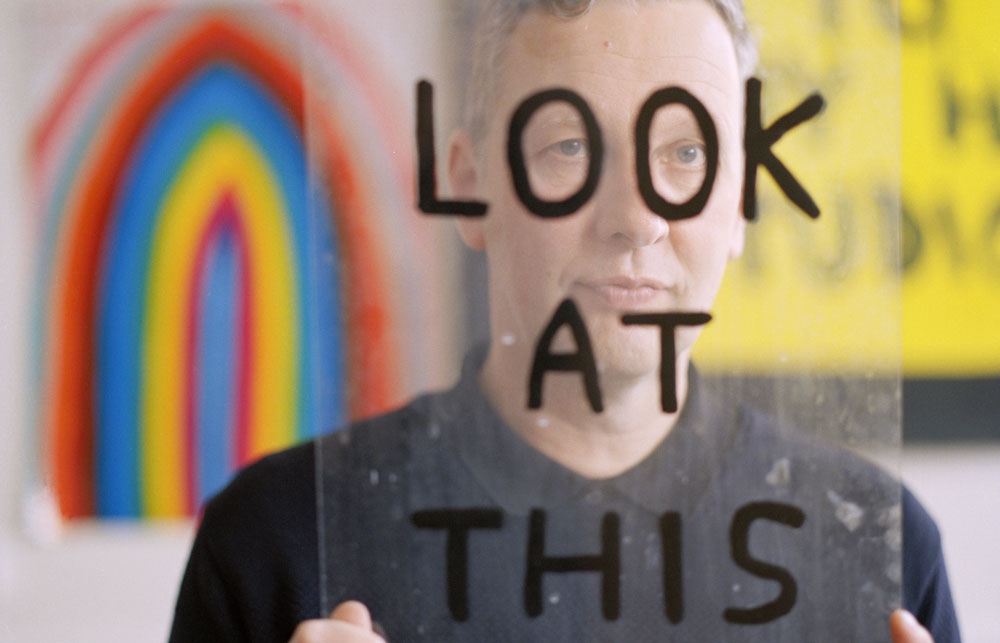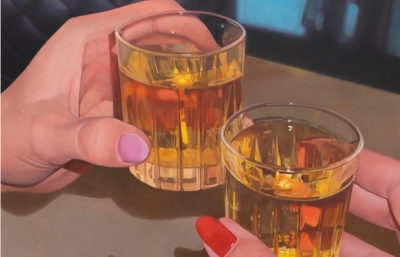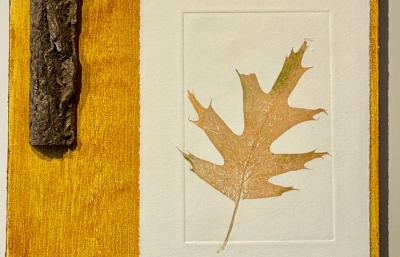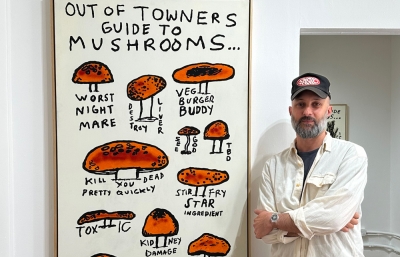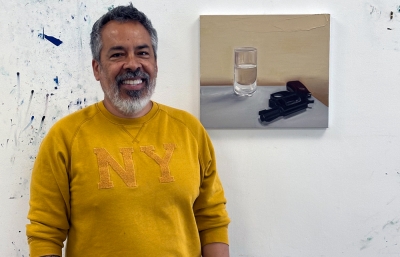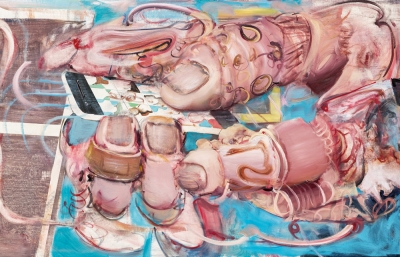David Shrigley
A Serious Man
Interview by Evan Pricco // Portrait by Andrew Quinn
“I've had a lot of really weird thoughts that should never leave my head.” This is one of the last musings David Shrigley shares over the course of three conversations taking place over multiple hours, and it's the first thing you should know about the English-born, Glasgow-trained, and now Brighton-based conceptual artist. He is eminently recognized worldwide for his craft, a deadpan humorist with an irresistible little penchant for morbidity and absurdity. At any point over the last 30 years, we could have spoken to Shrigley about his artwork, but it feels more urgent to speak with him in 2023, as an artist who has managed the social media universe, the contemporary art world, and the occasional foray into interactive art without a compromise or sudden shift of aesthetics. He is who he is.
What I learned over the course of our conversations is that although Shrigley claims to contradict himself, he is quite honest and direct with the trajectory his career has taken. He’s got his dog, someone cleans his paint brushes, he paints five days a week, and about two of those days are great. After a snafu with Zoom and a lost notebook, Shrigley observed that he just might be obsessive-compulsive. Which seemed like a good place to start.

Evan Pricco: How many interviews do you think you have done over the last 30 years?
David Shrigley: A lot? The fact that the video wasn't working when we first got on wasn't really bothering me that much. It was the fact that I couldn't find my little book that I doodle in while I'm on Zoom calls, and I still can't find it; I have no idea where it is. I've actually realized that I'm actually a bit of an obsessive-compulsive.
I would assume you would be a tad obsessive-compulsive.
Yeah, I am a bit. I mean, I realize it's not as helpful as it is unhelpful, you know what I mean? There are things where I get a bit agitated because I can't find my special notebook. But then again, the fact that I have a notebook is kind of interesting. So that's good.
What comes first: the line or the image?
The line, the text of the image. Well… actually the image comes first. There are four stages.
The first stage is I look through the numerous books on my bookshelf, or mostly nowadays I look on the internet for images. And then I find images I think are interesting, and often I’m trying to find things that I've never drawn or painted a picture of before. There are not actually that many themes in the world. And I describe the image. I write down what the image is, like a crocodile holding a child's arm or something, and I write that down.
Once it's time to draw, to paint, I look that up again, and normally I can't remember what it looked like. Then I make a drawing and then I go back to it afterward, usually adding some text to it. So that's usually the way it works: there's image, text, text, image. And usually, the image comes first. But there are layers of me trying to deceive myself or trying to forget what I was originally inspired by.
I don't really have a sketchbook as such. I just have books with some very crude drawings that are sort of memory aids. Because I am, as it turns out, slightly obsessive-compulsive. I don't like drawing. The first line has to be the last line if you know what I mean. I can't redo anything. I can't make a preparatory sketch unless it's sort of in a two-centimeter square in the corner of this book. Once this book is finished, there's loads more books like it.

So you’re replaying a memory in your head, but then making something slightly dark and funny about it. I like the fact that you're conversing with yourself a couple of times.
The really useful thing is, I'm not graphically… I'm really not very talented. Like, I'll draw things, or I tend to draw things that are really quite difficult to draw because I know that I won't do it very well. If it's too easy I might make something that's too aesthetic, that might look like an illustration. And I don't like illustration very much. The more awkward and strange they are, the more I'm intrigued by them, I suppose. And then there's always a moment in the studio these days when I'm painting and I have the luxury of having somebody who washes my paint brushes for me. I’ll ask her, "What's that? What's that?" And she knows the drill. She has to say, "It's a horse." And I say, "Yes, it's a horse. Good." And if she says, "Oh, it's a dog, or is it like a llama, something like that?" I say, "No," and I get really disappointed. "What do you think it is?" "I think it's a llama." "All right, we'll change it into a llama then." I mean, this is a dumbass kind of way of making images. But this is it for me, and this is what I'm sort of passionate about and it has become my area of expertise.
But okay, so the image that you used the other day about shitting on Putin. It looked like Putin. So what was the vetting process on that one? Did you look, go and say, who does this look like?
Yeah. She said Putin. So that was fine.
What happens if she said it looked like somebody else? Would it be that person?
Yeah, it would. I mean, it would've been, I don't know, Truman Capote. It might not be the most ubiquitously understood reference.
Right. And if it was Truman Capote, you might not have somebody shit on their head.
No, I have far more respect for Truman Capote than Vladimir Putin.

You've reiterated a couple of times in our discussions that you are not good at painting. At what point in your life did you go, "You know what? I can still do this, but I'm not a great painter." Like, when was that moment of self-discovery?
Well, I suppose that painting and drawing graphic art is a means to an end. I do have some facility in trying to render images that are recognizable to other human beings. But I actually have come to the conclusion that it's quite useful to be so inept. If I had more skill, objective skill, the work would be very different. And I feel like it's actually an advantage to be a bit rubbish, because, in some ways, that’s good, too. You can't really make punk rock if you're really good at playing the guitar. It's like orchestral musicians, they're technicians. And in order to make the work that I make, it's quite important that I'm not very talented at rendering three-dimensional space on a page.
This is what we were talking about before. Does your work translate into German, or does it translate into Russian? Because there is this universal feeling in your work that seems to come through, no matter the language. These images and text lines you create, if you were painting like Delacroix, just wouldn't be universal.
I mean, sometimes I look at other artists and I think, "Wow. What would I do if I could paint like that?"
Who was the last painter you had that conversation with yourself about?
Neo Rauch, the very popular German painter. And I sort of like his work. It's somehow not very satisfying as painting, but image-wise, I think it's really beautifully rendered and the colors are really nice.
But I was thinking, "Wow. I wonder what I would do if I could paint like that if I had been properly schooled." I don't know. It's a moot point. But I did actually go to Glasgow School of Art, which has a, well, at least when I went there, it had quite a reputation as a figurative painting school. In the early ’90s or late ’80s, there were quite a number of noteworthy painters, none of whom are probably particularly popular now. But when I was there, I looked at those artists and I thought, I'm never going to be one of them. I can't do that.
The thing about interviewing me, Evan, you need to understand, and I should have told you this before we started— but I have a habit of contradicting myself. So you may find that I've given you answers to questions and told you anecdotes that really are very much counter to previous interviews I've done, where I've said something completely different. But having been interviewed many times over the years, I realized that part of the joy of being interviewed is that you can change your mind.

Well, in the end, the only thing that matters is the work, so…
Yes. And it's also illustrative of the fact that one shouldn't hold too much store in things that artists say, because sometimes they just talk a lot of shit. I mean, obviously, I talk a lot of shit, but usually, it's not offensive, like some artists I could mention. It's responsible in the sense that I have a progressive political viewpoint and a compassionate worldview. However, I often can't remember what I've said before. I'm not one of those dudes who hangs a lot on that big book about art in theory type thing. I've never read that book. I just make it up as I go along. I'm not an academic type of artist. I'm a natural artist. That's what I am. I'm an artist who is not fazed by a blank sheet of paper. I see the blank piece of paper as an opportunity, not as something that should be feared. It's an opportunity to occupy the space.
So you would not say to anybody that you’re a suffering artist?
Well, I probably have said that at one point. And sometimes, as you know, often when words are transcribed, it's difficult to indicate that they were meant ironically. Unless, where I've said I'm a genius, for example, and apparently I've said that and it's been written down and I've seen it written down several times. Obviously, I'm not a genius, and obviously, I was being ironic because only a dick would say something like that. Or a genius. What were you asking me, sorry?
I don’t remember. Maybe something about suffering or Vladimir Putin? Or Capote?
I've got a slight ear infection and sometimes art is difficult to make. I kind of fulfilled my obligations as far as forthcoming exhibitions are concerned. So now I'm basically making whatever I like, and no one knows I'm making it. It's not for anything, just filling up the box of finished work so that when somebody places an obligation upon me, I will be able to meet it. It will be done.
But in order to get to that stage, usually I’m on deadline and that sort of makes the work. Whereas now, when I’m not on a deadline, and this has happened as a result… it kind of started in the pandemic, where I made a lot of work and stopped traveling. So I've got a lot done and now I'm in this situation where I don't have to make the work. I could just roll a joint and get stoned and go up the hill and hang out with my dog, albeit, it is really cold. I wouldn't do that. Or I could go to the cinema during the day. I could read a book.

By the way, are you doing any of this today, or is this just all in theory?
I haven't done it today, obviously. But, yeah, I do all of those things. Reading books, occasionally smoking weed, walking my dog. I do that very regularly. The dog was in the studio today, and I got paint on her, so that’s not very good. I got pink paint on the dog because she insisted on standing very close to the painting area. But anyway, the point being that you have a very different attitude during the kind of experimental zone, which is kind of where you want to be because you're just making art because it's a force of habit somehow. And that is a way of switching off, I've realized. So I'm in a good place now. But you still have to be disciplined. You still have to get up and go to the studio despite the fact that you've got a slight ear infection and you're tired, maybe because of just smoking weed that weekend.
I’m going to ask a real direct question, like a real interviewer asking a question: What you're describing is years and years of getting to a point where you can have this situation where you have work in the coffers, it's ready to go if you need to. You're in a zone, you have a level of success that has allowed and afforded you the opportunity to have a certain sort of life situation. But it took many years to get there. You might be slightly trained in the suffering of being an artist and now you're grown up so it's maybe not as daunting. Okay, there might be a question there. I'm not actually sure.
The only thing about success that you notice, I would imagine, is its arrival and its departure. Once you're in that state of being a successful artist, it's just normalized. But for me, I think it's taken me quite a while to realize I can do anything I want to do, really, within reason. I mean all of the projects that I make that aren’t seemingly just graphic art, they really don't make any commercial sense and are slightly unpopular with the commercial galleries that I work with. I made a piece called the Mayfair Tennis Ball Exchange a couple of years ago, where people were invited to bring tennis balls to the gallery. I made an installation of 14,000 new tennis balls and people were invited to bring old tennis balls, perhaps that their dog had been chewing and stuff, and replace it with a brand new tennis ball. And that was a project that was the kind of thing I wanted to make.
The gallery in London, Stephen Friedman, was very accommodating. But they were only actually accommodating because they said, "Yeah, but could we have some drawings as well?" And I'd already done the drawings, obviously. So I said, "You can have drawings, I just don't want to exhibit them, I just want the tennis balls." The gallery responded, "Okay, okay, how many do you want?" And I was like, "Loads, loads." And the gallery sorted it out. So that's the way it worked.
You've got to remind yourself that you're allowed to make tennis ball-based art if you want to. And it's good to make the tennis ball-based art or the other things that I make which don't have a place in the world.
But I’ve always considered you a conceptual artist.
That's great, because that's kind of what I am, in a way. Or at least, I come from that. The artists that I admire the most are conceptual artists, like Marcel Duchamp. That's where I'm from.

What made you stay in Glasgow for so long? What attracted you to that city?
Well, there are two questions there, what made me stay, and what made me go in the first place? I went to Glasgow School of Art, which is quite a prestigious art school, and I grew up in Leicester, which as you probably know, is in the middle of England, a not particularly noteworthy, small provincial city in the Midlands. Glasgow seemed incredibly exotic when I had the opportunity to go and study there. I'd never actually been to Scotland before, even though it's only 350 miles from where I grew up. It was 1987, and it seemed incredibly exotic. It's a big Victorian city and the art school has a real reputation and it was in a very significant building, albeit it's burned down a couple of times since then.
It was exciting and it was a great time to be there. I really enjoyed the experience of being in Glasgow as a whole, and then when I left art school, there was a community of artists who wanted to stay in Glasgow and be artists there, where they could do artist-run projects and stuff. It never really occurred to me to go anywhere else. I really enjoyed it and it had everything that I needed to sustain me. There is a big music scene in Glasgow, which I found very nourishing. It was living in a foreign country, but it wasn't quite a foreign country. I stayed for a long time.

As you were painting in the studio today, do you still bring a massive amount of joy to it? When you're saying that you have to, at times, motivate yourself a little bit, do you still get that feeling of enjoyment this many years into your career?
Yeah, I think. But one thing I say very often is, well there's a couple of things I say, but my own personal motivational statement is: just get on with it. I have this written on the little cards stuck to the wall in the studio. Just get on with it. If you just get on with it, the work makes itself. So it doesn't matter, meaning that, even when you're kind of depressed or you're feeling really fed up and you just don't want to do anything, just do it anyway. But also at the same time, I try to treat every day as if it's my first day. Maybe it's my first day at art school where everything is just exciting, different, and new, and I can do whatever I want and it's totally fine.
But I guess the secret is to fully embrace it. So when it's going well in the studio, and I work five days a week and usually two days a week are really, really good. Two days are a bit of a grind, so, on the fourth day, I get home early. I go home early and take the dog for a walk and smoke weed. So in answer to that question, it is, yeah, it is really exciting. But you have to embrace the opportunity and I have to remind myself that I can do anything I want. And if you don't want to do it, you don't have to do it, it's fine.
But you do have to do something. I am also kind of miserable if I don't make any art. I mean I'm happy if I can read all day, then I'm quite happy. And I like going to see music, going to see bands. I like going to see football matches, soccer. But still, I kind of have to make some art, otherwise, I'm just a bit miserable. I really love doing that. When I paint a picture, I have a memory of being five years old at school, the first year of school where they just give you some paints and a piece of paper and you just paint a picture. Just be there for an hour. Or if you're a child, it is probably five minutes. But it feels the same. And in my mind, the piece of paper that I was working on at that age is the same size as the piece of paper I'm working on now. It probably isn't, but I was tiny then. But it's the same thrill where you can do anything you like. You can paint anything you like and you can say anything you like. And that is an immense privilege. The privileged position that I find myself in.
This interview was originally published in the Summer 2023 Quarterly. David Shrigley’s Instagram is one of the best in the world, so follow him at @davidshrigley
Visit the Shrig Shop at shrigshop.com for all Shirgley products, and David sends a thank you to Jealous Gallery, who makes his prints.

